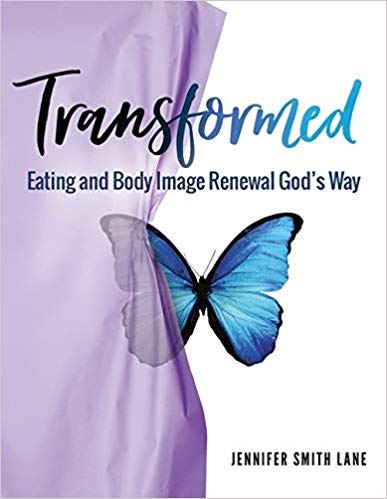Row after row of airbrushed magazine covers. Passionate testimonials about new diet plans. Social media posts featuring idealized images. It can be hard to navigate through all the confusing messages we receive each day about food, eating, and our appearance.
For many people, the issues around food and body image can quickly become entangled.
The devasting reality is that not only are these issues often difficult to separate, many people suffer from consequences of trying to limit or manipulate food consumption to reach typically unrealistic goals.
Eating disorders have quietly become a significant concern as early as the pre-teen years; but they remain prevalent for both men and women long into adulthood. More than 30 million people (including 10 million men) in the United States alone suffer from a medically diagnosed eating disorder, such as anorexia or bulimia. However, millions more struggle with keeping a healthy perspective on food and their bodies.
The deeper question for believers is not only how did this issue become so pervasive, but does God have anything to say about it?
Jennifer Smith Lane, co-founder of the Michigan Eating Disorders Alliance, knows this struggle personally. In her new book, Transformed: Eating and Body Image Renewal God’s Way, Lane provides a biblically-based resource to help people break through the lies that can keep them stuck in a cycle of pain, suffering, and sin.

Photo Credit: ©GettyImages/Sam Thomas
What is ‘Disordered Eating?’
In a recent interview, Jen clarified that even if someone doesn’t have a medically-diagnosed eating disorder, they might still suffer from a destructive eating habit known as “disordered eating.”
This term describes a range of harmful eating patterns typically employed to try to manage body image issues. These more subtle behaviors usually involve an individual who spends an excessive amount of time, energy, or resources on food-related issues.
It might be someone who is constantly preoccupied with eating; whether finding ways to indulge, or working to limit their food consumption. It might involve constantly dieting or exercising to achieve or maintain unrealistic weight goals.
Or, disordered eating can result when food is regularly used as a way to cope with stress.
Despite the very complex reasons that men and women find themselves struggling with disordered eating, Lane believes there are common underlying lies that keep them in a cycle of shame and despair.
However, God offers hope in the midst of this struggle. Lane believes God can help men and women transform their perspective and live in freedom regardless of where they fall on the disordered eating spectrum.
Here are four encouragements to those suffering with disordered eating:
Truth Transforms Lies that Lead to Disordered Eating
While qualified medical personnel and specialized treatment were significant tools to help treat her eating disorder, Lane found that complete healing was only possible after she addressed all of the entangling physical, emotional, and spiritual issues.
“Most mental health experts claim the only hope people who suffer from disordered eating can have is to be able to manage their symptoms,” says Lane. “But I believe God can completely heal.”
For Lane, seeking medical treatment was vital to her physical health; and she advocates for treatment. But she also found God’s truth paved the way for total healing.
God’s truth transforms disordered eating because disordered eating is often rooted in lies. Lane finds many people internalize hurtful or negative statements. If a parent labeled a child as worthless or lazy, when those thoughts replay over time and accumulate in one’s mind, it is easy for those lies to begin to feel like truth.
Or when people compare themselves to pictures in magazines, it is easy to believe the lie that they don’t measure up to the images. Some people wrestle with the lie that they will be happy if they reach a certain number on the scale or a certain percentage of body fat.
As men and women internalize those lies, food can be one area where they attempt to create a different truth or exercise control that unfortunately often results in unexpected and dangerous results.
It was only when Lane was able to address the root lies and replace them with God’s truth that she found freedom. The truth of scripture is that every person is uniquely created by God. God considers each person be a masterpiece of His creation and God deeply loves each person.
Lane recommends writing out scripture passages that proclaim these truths and strategically placing those reminders where they can be seen throughout the day.
Start with these two Bible passages and build a foundation of truths that speak to you: Psalm 139, Ephesians 2:10.

Photo Credit: ©GettyImages
Love Transforms the Striving of Disordered Eating
Love between people can be fickle because it is usually based on outward efforts or shifting emotions.
“The striving to get or keep love leaves many people feeling empty,” explained Lane. “People who suffer from disordered eating often feel unloved and are trying to achieve a level of perceived perfection in an attempt to find love.”
Instead, the transforming reminder is that God’s love is a gift that does not need to be earned.
Lane explained that reflecting on the cross can be valuable for people who struggle with disordered eating because it is a tangible demonstration of God’s love. The assurance that Jesus’ death and resurrection covers every sin means that there is nothing that God cannot forgive.
It means that God accepts people for who they are now, and not just if they achieve a certain standard, whether a number on the scale, a dress size, or a muscle measurement. The reality of that kind of love changes one’s ability to accept and love themselves.
If friends are working together to find freedom from disordered eating, Lane recommends texting each other even simple reminders of God’s love, such as “You are Loved,” to be encouraged that God loves you yesterday, today, and tomorrow.
Start with these Bible passages focused on God’s love: Jeremiah 31:3, Ephesians 3:14-19.
Grace Transforms Legalistic Disordered Eating Habits
Many people engaged in disordered eating tend to be caught in the trap of legalistic living, to control eating habits or change their physical appearance.
Whatever has brought someone to the point of excessively managing their food intake, it is usually difficult or deep-seated issues. They might be grappling with the damaging effects of abuse or trauma. Or, they might be perfectionists who are using legalistic rules to achieve a self-imposed goal. The coping mechanism to manage these feelings can be very tight adherence to the rules of a diet regimen, or strict focus on particular outcomes such as weight goals.
“The problem is that following rules can’t rescue us from the underlying issues, only Jesus can,” said Lane. “The problem for people who suffer from disordered eating is that grace, or unearned favor from God, is unmeasurable. It can be harder to live in grace because you don’t have a checklist to complete or a measurable outcome to achieve.”
Accepting God’s grace transforms because men and women have the opportunity to be released from legalism and the traps of measurable goals.
Lane encourages people who struggle with severely limiting their food intake to write out their rules or self-imposed schedules. Through prayer, those restrictions can be offered to God so that He can help men and women to trust Him as they relax those rules and experience freedom.
Here are a few Bible passages highlighting God’s grace: Romans 6:14, Ephesians 2:8-9, Colossians 2:16-23.

Photo Credit: ©Gettyimages/Mangos
Worship Transforms the Focus on Disordered Eating
“For most people, disordered eating becomes an idol in their lives because it takes highest priority,” observed Lane. “I believe the Bible shows us that anything that comes before God is an idol that actually ends us enslaving us.”
For Lane, the transforming power of worship is that worship takes our focus off of the individual and refocuses the perspective back on God. Allowing God to become the priority and have His proper place in our lives reshapes our attitudes and limits our ability to allow other things to become priorities.
Suggestions that Lane has found helpful is to play worship music to refocus her attention on God. Reading scripture aloud or finding a verse or prayer to repeat in times of struggle can also help realign one’s perspective.
Try meditating on these Bible passages on putting God first: Exodus 20:3, Matthew 6:33, 1 Corinthians 10:31.
Freedom from Eating Disorders is Possible
For many who suffer from disordered eating, Lane explained that it can feel like a prison. Even though the keys are available to open the door to freedom, it can sometimes feel easier to stay imprisoned in a place where there is an appearance of control.
However, unlocking the doors allows God to come into the situation, to be present in the midst of suffering, and to gently help guide His beloved children out into freedom.
More information about how God can transform disordered eating is available at jennifersmithlane.com.
 Jennifer Smith Lane (author of Transformed: Eating and Body Image Renewal God’s Way), and Lisa Samra, author of this article, worship together weekly. Along with her husband, Samra endorsed Lane’s book saying, “Jen's life has truly been transformed by the power of God's Spirit. We are grateful she has written this book to help readers discover the Scriptural truths and spiritual practices that allowed her to experience freedom from lies and shame." Lisa Samra was born and raised in Texas, graduated with a Bachelor of Journalism from the University of Texas and earned a Master of Biblical Studies degree from Dallas Theological Seminary. Lisa now lives in Grand Rapids, Mich., with her husband, Jim, and their four children. She is a regular contributor to Crosswalk.com, Our Daily Bread, and her work has also appeared in a variety of publications and online sites. Lisa loves to travel and often finds inspiration from experiencing the beauty of diverse cultures, places and people. Lisa enjoys good coffee, running and reading, just not all at the same time.
Jennifer Smith Lane (author of Transformed: Eating and Body Image Renewal God’s Way), and Lisa Samra, author of this article, worship together weekly. Along with her husband, Samra endorsed Lane’s book saying, “Jen's life has truly been transformed by the power of God's Spirit. We are grateful she has written this book to help readers discover the Scriptural truths and spiritual practices that allowed her to experience freedom from lies and shame." Lisa Samra was born and raised in Texas, graduated with a Bachelor of Journalism from the University of Texas and earned a Master of Biblical Studies degree from Dallas Theological Seminary. Lisa now lives in Grand Rapids, Mich., with her husband, Jim, and their four children. She is a regular contributor to Crosswalk.com, Our Daily Bread, and her work has also appeared in a variety of publications and online sites. Lisa loves to travel and often finds inspiration from experiencing the beauty of diverse cultures, places and people. Lisa enjoys good coffee, running and reading, just not all at the same time.
Photo Credit: ©GettyImages/Detry26